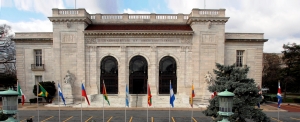Displaying items by tag: DDHH
Justice International delivers letter to OAS' Secretaries of Foreign Affairs on the application of democratic charter to Venezuela
Caracas, July 19, 2017.
His Excellency Ambassador Calles Castillo:
We, members of the Venezuelan diaspora many exiles or displaced in different countries of the world as a result of the crisis that our country is living, we respectfully come before you in order to send you the generalized concern of Venezuelan civil society in relation to the deepening of the crisis in our country and the urgent need to fully activate the Inter-American Democratic Charter for Venezuela.
The purpose of this letter is to request your good pro in favor of convening the Inter-American Democratic Charter in the face of the institutional crisis in Venezuela, an initiative that has been promoted by the Secretary General of the Organization of American States (OAS), Luis Almagro.
We also seek to submit to your consideration updated informative material, developed by institutions and specialized NGOs, in relation to the deepening of the Venezuelan crisis and its ramifications in terms of democracy, human rights and humanitarian crisis.
Venezuela is experiencing a social, political and economic crisis of considerable magnitude. The struggle for power in Venezuela has resulted in a political and human rights crisis widely known by the international community.
Today, Venezuela ranks second in the statistics of violent deaths per capita in the world. Poverty 1 in Venezuela has reached alarming figures: 80% of the population is in a state of poverty. The daily life of the economy of the Venezuelan family is affected by the highest inflation 2 in the world and by levels of shortages of products and, consequently, of 3 basic services that affect rights as fundamental as the right to health and feeding.
This problem has led to a humanitarian crisis in Venezuela, without historical precedents for this South American country.
The serious situation regarding the flagrant violations of democratic principles and human rights by the Venezuelan State, as well as the humanitarian crisis that this country is experiencing, is a subject known to you as the representative of your country in the deliberative instance of the OAS, the Permanent Council.
You will remember that during a call prior to mid-2016 to discuss the issue of the activation of the Inter-American Democratic Charter for the Venezuelan case, the violation of human rights and the humanitarian crisis were discussed. On that occasion, the Secretary General of the institution made the presentation of order before the Permanent Council, in which, with the proper evidence, he went on to review the situation of democratic institutions in Venezuela and the crisis of rights that Venezuelans experienced for that time
This is how two key references to understand the breadth and severity of the Venezuelan crisis in a historical analysis are the letter calling for the meeting of the Permanent Council interposed by Luis Almagro Secretary General of the Organization of States
1 According to the UNODC report, Venezuela ranked second in the world in the number of violent deaths per 100,000 inhabitants in 2014, see statistics on this in https://data.unodc.org/.
By 2015, Venezuela could have surpassed Honduras and become the most violent country in the world, according to information from the Venezuelan Observatory of Violence (OVV), see report on this subject at ABC Madrid. "Venezuela reaches in 2015 historical figure of homicides: 90 per 100,000 inhabitants." [www.abc.es], December 29, 2015, [Date of consultation: July 3, 2016]. Americans (OAS), as well as its subsequent speech, center of the discussion in the Permanent Council on the activation of the Inter-American Democratic Charter for the Venezuelan case, dated June 23, 2016. Almagro states in these documents the "alteration of the order constitutional and how it seriously affects the democratic order of the Bolivarian Republic of Venezuela ". Almagro also includes the 4th issue of the humanitarian crisis in the health sector in Venezuela as part of the facts alleged in the discussion that justifies the activation of a dialogue on the state of democracy in Venezuela within the framework of the regulations stipulated in the Charter Inter-American Democratic
As of the date of the aforementioned Permanent Council, the Venezuelan crisis has worsened. The lack of freedom of expression, the growing repression and insecurity, have been compounded by the exacerbation of shortages in terms of medicines and lack of food.
Poverty and the food crisis are aggravated by new food distribution policies, a mechanism by many labeled a political nature called CLAP, which has been denounced by several international NGOs, including the IACHR itself as a mechanism that violates the principle of non-discrimination. discrimination, enshrined in Article 2, paragraph 2, of the International Covenant on Economic, Social and Cultural Rights (ICESCR), a principle that must prevail as an integral aspect of the rights enshrined in that International Covenant. The worsening of the crisis is reflected in various works of various institutions and organizations, both national and international, that will serve as an update on the negative progress of the crisis in Venezuela.
In general, the conclusions of these documents suggest, contrary to the principles of national and international cooperation that govern the ICESCR, that the Venezuelan State has opted for antagonism and political persecution of those members of Venezuelan society that make up the network of agents necessary for the proper functioning of public systems linked to fundamental rights and democracy in general, in what represents the collapse of democratic institutions and a serious upsurge of human rights violations in Venezuela.
One of the most serious expressions of this situation, where the increase of the crisis and repression are combined, is the situation of political prisoners. The deplorable state of health of hundreds of prisoners for dissent from the regime is another violation that deserves special attention in the complaint we want to expose before you.
These people are denied even the right to medical care when they have requested it. The NGO Foro Penal Venezolano denounces that the lack of access to health services represents a modus operandi of the Venezuelan State. This NGO argues that the Venezuelan State has used the deprivation of health services as an extension of the mechanisms of State repression against political prisoners.
In Venezuela, it is urgent to take measures to change this situation, since it depends on the protection of the right to health, the right to food and basic political and civil rights for democratic coexistence and with it the prevention of very serious events that entail imminent risks for the development of a dignified life and the preservation of it of the Venezuelan citizenship, consequences by definition of irreparable condition. The application of the Democratic Charter will be the framework that will allow the recovery of democratic institutions and with it the rescue of the necessary national and international cooperation mechanisms to achieve the advancement of social and civic-political initiatives that allow facing the serious crisis that afflicts Venezuelans today.
Citizen Ambassador, your consideration of the support of an initiative in favor of the full activation of the Inter-American Democratic Charter in Venezuela to restore the social cooperation processes necessary to face the crisis will be appreciated by the multitude of Venezuelans who today suffer the calamities that the The breakdown of democratic institutions has brought to the country, as invoked in the document recently delivered to the OAS presidency by its Secretary General.
The conclusion of this document is a call to the solidarity of the peoples of the continent, of the members of the OAS, in defense of Democracy in Venezuela: "... the sign of continental geography has known how to put solidarity as a standard liberator ... That is today the moral and ethical obligation, the categorical imperative that we have as nations and as an Organization: to recover Venezuela for the principles of the Inter-American System and return democracy to the country. "
Without further reference, we bid farewell to you and wish you much success in your hard work for the defense of democracy in the Americas.
Justice International intensifies work to restablish democracy in Venezuela at OAS General Assembly meeting
Caracas, June 23, 2017.
In the framework of the 47th meeting of the General Assembly of the Organization of American States (OAS), held between June 19 and 21 in Cancun, Justice International called for action to restore democracy , the defense of human rights and the exit of the humanitarian crisis in Venezuela.
In a letter sent by the human rights NGO, the ambassadors are exposed to the OAS (particularly Nicaragua, Saint Kitts and Nevis, Saint Vincent and the Grenadines, Dominica, Bolivia, El Salvador, Ecuador, Grenada, Haiti, Trinidad and Tobago). Tobago, Dominican Republic, Antigua and Barbuda and Suriname) informative material on the exacerbation of the humanitarian crisis and the breakdown of democratic instructions to be taken into consideration by their respective governments.
Prior to this letter, Justice International along with other Venezuelan organizations abroad have been working on this type of action to pressure the countries of the region with the aim of promoting actions leading to a resolution of the Venezuelan crisis.
One of these actions, led by Karym Salcedo, representative of the NGO in Miami together with other local organizations, was entrusted with handing over a letter to the diplomatic authorities of El Salvador requesting the support of the Salvadoran delegation to the OAS regarding the the Inter-American Democratic Charter (CID), after the refusal of this country in the vote for the application of this mechanism to Venezuela on June 23, 2016
Likewise, representatives of Justice International in collaboration with other organizations had the opportunity to submit a petition, backed by 6615 signatures, to demand the continuation of the efforts for the application of the Inter-American Democratic Charter (CID). The initiative was given by Brenda Garrido and was delivered and received by the OAS Secretary General, Luis Almagro, on March 4, 2017.
These projects were carried out within the framework of the #OEACartaYA campaign, organized by various organizations promoting democracy in Venezuela. The platform of this campaign and other related ones can be found at www.justiciainternacional.org and at https://twitter.com/JusticiaIntl

